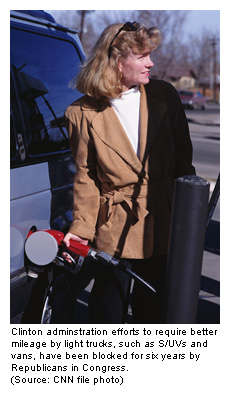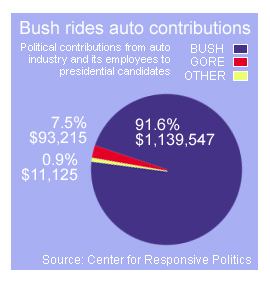|
Bush takes backseat to auto regulation
|
 |
October 19, 2000: 12:31 p.m. ET
Safety issues raised by Firestone tire recall supersede candidates' influence
By Staff Writer Chris Isidore
|
NEW YORK (CNNfn) - For years Republicans have put brakes on Democratic efforts to regulate the auto industry.
But the recall of 6.5 million Firestone brand tires and the reports of 119 deaths associated with accidents involving the tires and Ford Motor Co. (F: Research, Estimates) trucks have put regulatory efforts into high gear.
The resulting outcry has meant that no matter who wins the Nov. 7 election, tougher regulation of the industry is likely, according to both stock analysts and safety advocates. Some observers still expect greater regulatory effort, and costs, for the auto companies if Democrats capture the White House and/or Congress.
Click here for full CNN election coverage
And some of the Republican roadblocks to Democratic regulation efforts remain in place, especially in the area of the environment rather than safety regulation.
Six years ago the National Highway Traffic Safety Administration published a notice in the federal register, saying it was considering requiring better fuel economies in light trucks, such as the popular sport/utility vehicles (S/UVs), to bring them more into line with the mileage requirements of passenger cars.
Automakers objected, saying the only way they could hike the fuel efficiency of the guzzlers as much as 40 percent was to give them smaller, less powerful engines or make them smaller and lighter, and that consumers didn't want that kind of S/UV.
 The automakers found a sympathetic ear among Republicans in Congress, and every year since the rule was first proposed a rider on the Transportation Department's appropriations bill has blocked NHTSA from adjusting the fuel economy ratings, known as corporate average fuel economy standards, or CAFE, of the SU/Vs. The automakers found a sympathetic ear among Republicans in Congress, and every year since the rule was first proposed a rider on the Transportation Department's appropriations bill has blocked NHTSA from adjusting the fuel economy ratings, known as corporate average fuel economy standards, or CAFE, of the SU/Vs.
"CAFE is a counter-market regulatory scheme and it needs to be seriously reevaluated," said Brian Wallace, spokesman for DaimlerChrysler AG (DCX: Research, Estimates). "We firmly believe that it's new technology that will get us to better emissions, lower consumption, rather than legislative mandates."
But even if Gov. George W. Bush wins the election, industry officials and observers agree that the mood in Congress about NHTSA regulation changed swiftly and dramatically with the Firestone/Explorer case. A bill quickly passed Congress calling for tougher disclosure standards by automakers and tire companies, as well as tougher penalties, including possible criminal charges for executives who hid problems.
The politics of business: During the final month of the 2000 campaign, CNNfn.com will examine how key industries would fare under a Bush presidency or a Gore presidency. Each Monday and Thursday, CNNfn.com will turn its attention to a new sector. On Monday, we will profile what each candidate would mean for the tobacco industry.
And a rider similar to the fuel efficiency rider that had blocked NHTSA from rating the propensity of vehicles to rollover disappeared, clearing the way for the agency to tell consumers which vehicles are at greatest risk of a rollover. When the rankings come out, S/UVs will rank below cars in every instance.
"I think it's an overall trend that environmental standards and safety standards are getting tighter and tighter," said Gloria Bergquist, spokeswoman for the Alliance of Automobile Manufacturers, the trade group for the automakers which focuses on legislative and regulatory issues. "When you have an event like this (Firestone recall), that raises sensitivity about getting the safest vehicle possible."
Auto safety advocates also believe the mood in Washington about automotive regulation has changed significantly in recent months.
"There's been a difference in Congress," said Clarence Ditlow, executive director for the Center for Auto Safety. "I expect to see a much more favorable Congress next year, no matter who wins. People are not going to forget Firestone/Explorer quickly."
Ditlow, a supporter of Green Party Presidential candidate Ralph Nader, said he's disappointed in the Clinton administration's auto regulation efforts, saying it never fought Republican riders that tied regulators' hands. But he does believe that Gore would be tougher on regulation, especially environmental regulation, than Bush.
 Some auto industry experts also believe that automakers would be better off with a Bush administration due to different approaches on regulation. Bush opposes some key environmental initiatives, such as the multi-national "Kyoto protocol" on reducing global warming. Some auto industry experts also believe that automakers would be better off with a Bush administration due to different approaches on regulation. Bush opposes some key environmental initiatives, such as the multi-national "Kyoto protocol" on reducing global warming.
"I think the biggest risk is that Gore tends to be a little less practical in his approach," said David Cole, director of Office for Study of Automotive Transportation at the University of Michigan.
Cole said Bush's approach of providing market-based incentives to improve environmental performance will help the industry and the environment. He said too much money is being spent on getting relatively small emissions improvements in new cars rather than getting older cars that cause much of the pollution off the road.
"The environmental community has never been driven by economics," Cole said.
But the most significant new environmental standards being faced by the auto industry, the so-called Tier II clean air standards, are supported not only by the auto industry itself, but by both Gore and Bush. The rules are well on their way to implementation starting with the 2004 model year cars and being completely in place by the 2009 model year.
"That's moving forward. I can't imagine that would change," said Bergquist.
So stock analysts generally don't think the auto stocks will move significantly due to election, with the exception of an upset Nader victory.
 "I think we might have a slight degree of difference in the degree of aggressiveness in certain government bodies such as EPA and NHTSA," said Rod Lache, analyst with Deutsche Banc Alex. Brown. "But overall, even in a Bush administration, environmental regulations are going to become increasingly stringent." "I think we might have a slight degree of difference in the degree of aggressiveness in certain government bodies such as EPA and NHTSA," said Rod Lache, analyst with Deutsche Banc Alex. Brown. "But overall, even in a Bush administration, environmental regulations are going to become increasingly stringent."
Still, when it comes to political contributions from automakers, Bush is clearly in the driver's seat.
According to the Center for Responsive Politics, Bush has gotten 91.6 percent of political contributions from the industry and its employees, or $1,139,547. That's a higher percentage of donations going to Bush than given even by the energy and natural resource industries, from which he has gotten 90.5 percent of donations.
Gore has received only $93,215 from automakers and its employees. 
-- Click here to send e-mail to Chris Isidore
|
|
|
|
|
|
NHTSA
The Safety Forum
|
Note: Pages will open in a new browser window
External sites are not endorsed by CNNmoney
|
|
|
|
 |

|

